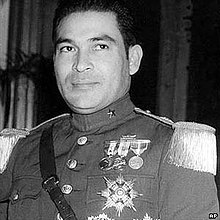1952 Cuban coup d'état
| 1952 Cuban coup d'état | |||||||
|---|---|---|---|---|---|---|---|
 Fulgencio Batista in 1952 | |||||||
| |||||||
| Belligerents | |||||||
|
|
| ||||||
| Commanders and leaders | |||||||
|
|
| ||||||
The 1952 Cuban coup d'état took place in Cuba on March 10, 1952, when the Cuban Constitutional Army, led by Fulgencio Batista, intervened in the election that was scheduled to be held on June 1, staging a coup d'état and establishing a de facto military dictatorship in the country.[1]
Background and events[]
This section needs expansion. You can help by . (June 2020) |
From the 1933 Sergeants' Revolt onwards, Fulgencio Batista acted as an éminence grise, making and undoing governments in Cuba.[2]
After eight years of government under the democratically-elected presidencies of Ramón Grau (1944–1948) and Carlos Prío Socarrás (1948–1952), Batista was one of the candidates in the 1952 election. However, as some of the polling put him in a distant third place, on March 10, 1952, just four months before the presidential election, Batista struck, using his position within the Army and being supported by some political sectors of the country. The coup itself was bloodless, but it attracted the attention and concern of most of the population. Batista overthrew President Carlos Prío Socarrás, canceled the election and took control of the government as "Provisional President."[citation needed]
The United States recognized his government on March 27.[3]
Aftermath[]
Batista (whose rule was formalized after the 1954 general election) went on to rule the country until January 1, 1959, when he was forced into exile with his family (first to the Trujillo–ruled Dominican Republic, then Corporatist Portugal and eventually Francoist Spain). Batista's exile marked the climax of the Cuban Revolution, which started on July 26, 1953 with the attack on the Moncada Barracks in Santiago de Cuba, and saw Fidel Castro emerging as the new leader of Cuba.[4]
See also[]
References[]
- ^ "Fatos históricos do dia 5 de abril" (in Portuguese). Noticias Terra.
- ^ Dabène, Olivier (2003). América Latina no século XX (in Portuguese). EDIPUCRS. p. 328. ISBN 9788574303475.
- ^ This date is given in many sources although there is none that seemed to be clearly definitive. The closest is a recommendation from US Secretary of State Dean Acheson to President Truman on March 24 recommending recognition on that date: Acheson, Dean (March 24, 1952). "Continuation of Diplomatic Relations with Cuba". Office of the Historian of the United States Department of State. United States Department of State. Retrieved March 9, 2017.
- ^ "Fulgencio Batista". Encyclopædia Britannica.
- Republic of Cuba (1902–1959)
- Political history of Cuba
- Military history of Cuba
- 1952 in Cuba
- March 1952 events
- Conflicts in 1952
- 1950s coups d'état and coup attempts